Losing a molar is a common condition in dental diseases. Therefore, many people are worried about whether losing a molar is harmful or not? The following article will provide you with information about the role of molars and the consequences of losing a molar, please follow along.

Location of molars
Adults usually have 28 to 32 teeth, divided into 4 groups: incisors, canines, premolars (small molars) and molars (large molars). From there, we can see that there are two types of molars: premolars and molars. However, when referring to molars, we often only refer to the group of molars.
Molars are located at the end of the jaw, numbered 6, 7 and 8. Of these, teeth 6 (first molar) and 7 (second molar) play an important role in chewing food, while tooth 8 is considered a redundant tooth because it has no important function.
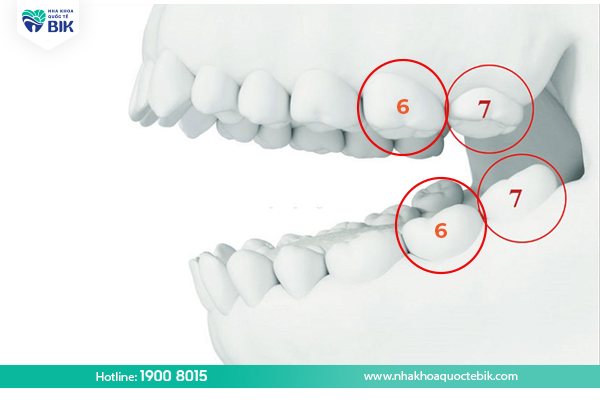
Causes of losing a molar
There can be many causes of losing a molar, including:
Poor nutrition
When the body lacks essential nutrients, especially calcium, the tooth enamel will become weak and no longer strong enough. This weakens the protective layer of the teeth, affecting the internal structure and making them susceptible to fracture when subjected to great chewing pressure. In addition, consuming foods high in sugar or containing stimulants also increases the risk of tooth loss.
Bad habits
Teeth grinding is one of the bad habits that damage tooth enamel and affect their internal structure.
Furthermore, smoking will lead to prolonged gingivitis and if left untreated will lead to tooth loss.
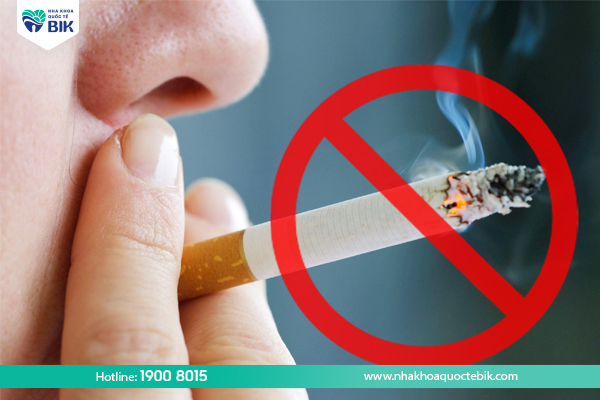
Due to old age
Chewing and grinding food for a long time will gradually cause teeth to age. This often happens to the elderly, combined with dangerous dental diseases that can lead to complete loss of molars.
Chewing hard foods
Regularly eating hard foods such as shellfish, candy, ice, etc. can damage the enamel and cause teeth to crack.
Poor oral hygiene
If you are lazy to brush your teeth, do not use dental floss, brush your teeth incorrectly, do not clean tartar regularly, or do not brush your teeth long enough and deep enough, not changing your toothbrush can cause problems such as gingivitis, tooth decay and increase the risk of tooth loss.
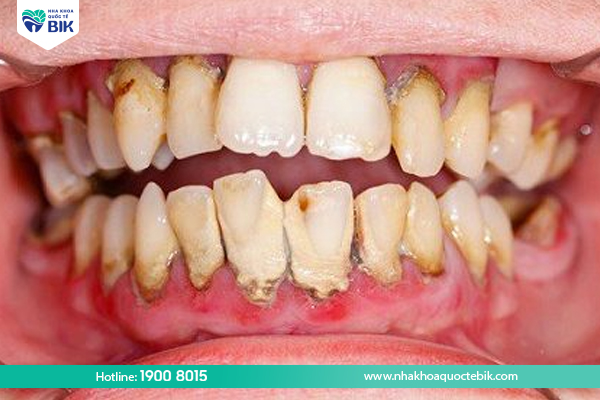
What are the harmful effects of losing a tooth?
Misalignment of adjacent teeth
All teeth have the function of supporting and complementing each other, creating a connection and helping to perfect the eating function. When you lose a tooth in your jaw, the neighboring teeth no longer have support and begin to move into the empty space, causing the neighboring teeth to shift. As a result, you may have difficulty eating and may have to chew on only one side of your jaw.
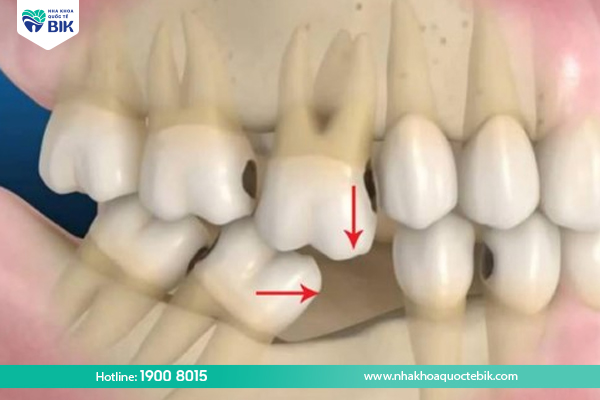
Decreased chewing function
The position of the molar is the place that endures the strongest chewing pressure in the entire jaw. Therefore, when a tooth is lost in the jaw, especially tooth number 6, the chewing pressure will be significantly reduced. This makes it difficult for the patient to grind food, causing the stomach to work at maximum capacity to digest food. This causes a great burden on the digestive system and reduces the ability to absorb nutrients.
Losing one tooth causes bone loss and loss of aesthetics
Many people think that losing one molar does not have a big impact on the beauty of the face. However, this is completely wrong and can cause patients to be subjective or negligent in correcting this condition early.
Losing one tooth is the leading cause of bone loss, seriously affecting the appearance of the face. At that time, the cheeks will be sucked in, the skin will sag and many wrinkles will appear, leading to rapid aging and you will look much older than your real age. In addition, jaw bone loss also changes the bone structure, causing the chin to move forward, the lips to become thinner, thereby losing the confident beauty as before.
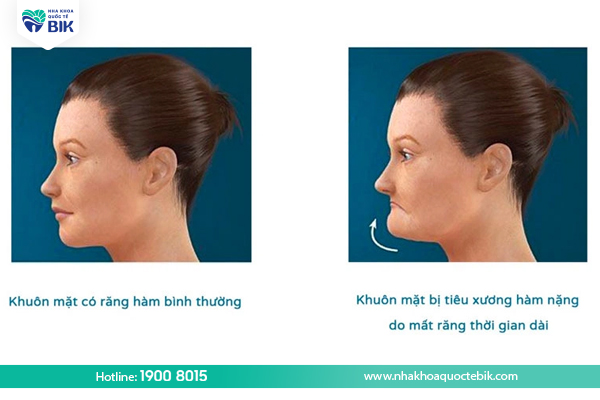
Losing teeth affects pronunciation
Losing teeth makes pronunciation imperfect, inaccurate and can cause lisping. This leads to a lack of confidence in communication.
Headaches, jaw pain appear
Losing teeth causes the jaw to no longer be in the correct position, putting pressure on the jaw joint. When chewing, this can cause jaw joint pain, headaches and in more severe cases, can lead to facial deviation and jaw muscle paralysis.
Solution when losing a molar
When losing a molar, the tooth should be restored as soon as possible to prevent dental problems.
There are 3 commonly used methods to replant molars, including:…
Removable dentures
The removable denture method includes a jaw frame made of plastic or metal, on which are removable dentures. This method is low cost and quick to perform, however, it only restores about 30-40% of chewing ability, is prone to falling out when eating or talking, causes damage to bones and gum atrophy, and is also not very durable.
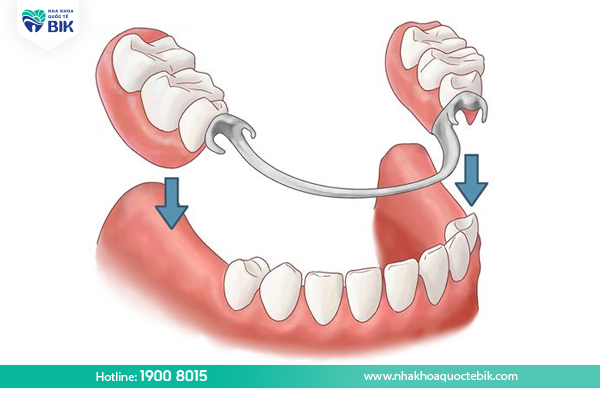
Porcelain bridge
This method uses the teeth next to the missing tooth as a pillar to attach the porcelain crown on top. Porcelain teeth are white like real teeth, have good chewing ability and are firmly fixed to the jaw, can be used for about 7-10 years. However, attaching a porcelain bridge does not prevent bone loss and can damage healthy teeth. Over time, these teeth will gradually weaken, causing tooth loss to spread more widely.
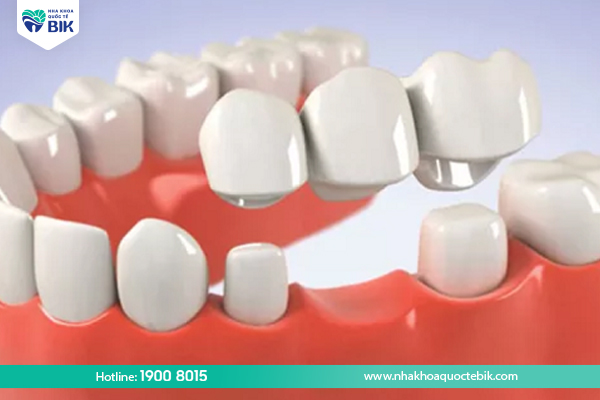
Implanting teeth
Implanting teeth is considered the most modern tooth restoration method when losing 1 or more teeth in the jaw and can restore chewing ability up to more than 90%. This method uses a Titanium post attached to the jawbone to replace the lost tooth root. This Implant post will be firmly attached to the jawbone, creating a solid tooth root and preventing bone loss. The top part of the Implant is the crown that has the same color, shape and size as a real tooth. Implantation helps people with missing teeth in the jaw to chew comfortably without causing damage to neighboring teeth, while overcoming the consequences of tooth loss, bringing high aesthetic results and can be used for life if properly cared for.
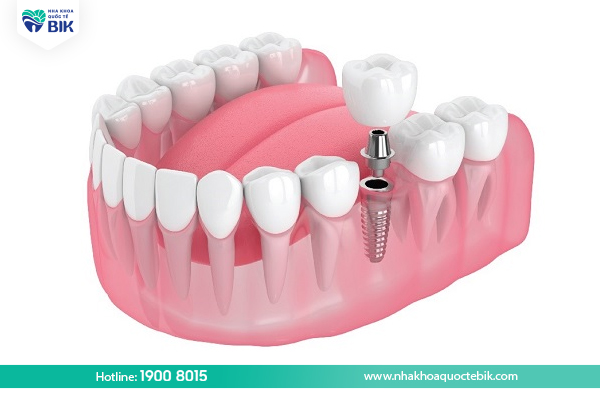
How many dentures should be made when losing 1 molar?
As mentioned earlier, to restore the ability to chew and aesthetics when losing 1 molar, we have 3 different methods. The choice of method will depend on the condition and position of your tooth:
Implanting teeth: If you decide to implant teeth to overcome the loss of 1 molar, you only need to implant 1 denture in the missing position.
Porcelain bridge: This method requires you to make a porcelain bridge consisting of 3 teeth, in which the 2 teeth next to the missing position will be ground down to replace the missing tooth.
Removable denture: To apply this method, you need to go to the dentist so that the doctor can examine and diagnose your oral condition to determine the number of teeth that need to be made.
In short, the question of whether or not to worry about losing a molar will have the answer yes. Losing molars (except for tooth number 8) will cause serious consequences. Therefore, if you are missing a molar, do not hesitate to go to a dental clinic to be examined and advised on the appropriate method.


















